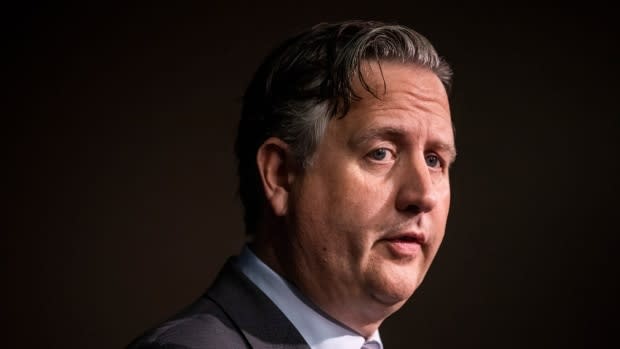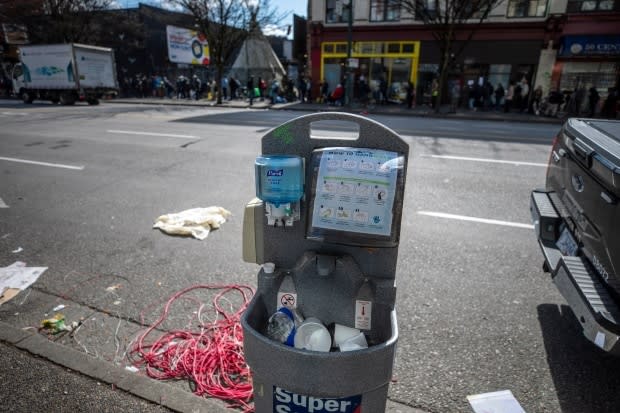City of Vancouver to provide cleaning and meals to Downtown Eastside SROs to slow COVID-19

The City of Vancouver has secured contracts to provide regular cleaning and meal delivery to residents at 21 single-room occupancy hotels on the Downtown Eastside.
Mayor Kennedy Stewart says according to the latest updates from health officials there are currently no confirmed outbreaks or clusters in the neighbourhood.
"We need to take more steps to keep it that way for longer," he said during a news conference on Friday.
City needs federal funding, says mayor
Stewart says the additional cleaning and meals are only stop gap measures.
"The food and cleaning contracts are only for the next two weeks, but we know they are critical for helping people keep their distance."
He's appealing to Vancouver residents and businesses to contribute whatever funding or supplies they can by going to the giveahandvancouver.ca website.
He's also calling on other levels of government to step up.
"We are talking to senior levels of government and other funding partners from charitable and philanthropic communities about how we can keep these programs going and add more services and programs that will slow transmission as we head toward the peak of the outbreak.''

The city says the Coal Harbour and Roundhouse community centres are now operating as referral-only emergency response centres ready to house up to 160 people.
Hundreds of hotel rooms have also been secured and Stewart says B.C. Housing expects there are enough of them to meet the needs identified by local health authorities.
"While we don't have an outbreak or cluster in the Downtown Eastside at the time, Dr. Bonnie Henry has said the virus is present in every community," said Stewart. "It's only a matter of time before it is in the Downtown Eastside."
Karen Ward, longtime Downtown Eastside resident and community organizer, believes the additional housing will make a huge difference.
"If people need to self isolate, simply having the option to [be housed] is going to make a huge difference because they didn't have that option like a week ago"
'Stop-gap' measures
The municipality has also partnered with the Atira Women's Resource Society to open a warehouse distribution centre at 41 East Hastings St. to provide the community with supplies.
Atira CEO Janice Abbot says they're in need of gloves, cleaning supplies and cellphones but also puzzles, games, magazines and books for those in isolation.
"Starting Monday you can drop stuff off," she said. "The distribution centre will supply every organization in the Downtown Eastside."
Also on Monday, Abbott says a transition house will open for women who are fleeing violence. "For them home is not a safe place to recover."
Mayor 'satisfied' with physical distancing
Two weeks after blasting reports of groups gathering outside, Vancouver Mayor Kennedy Stewart says most people are now complying with physical distancing measures.
Watch: Mayor Kennedy Stewart talks about the progress Vancouverites are making physical distancing
In response to a question about whether he would consider enforcing those measures with fines as cities like Toronto and Montreal are doing, Stewart said that he would wait for directions from the provincial health officer.
Safe supply plan rolling out
Last week, the provincial government released its plan to provide a safe supply of drugs during the COVID-19 pandemic amidst fears of an increasingly toxic illegal drug supply.
Between March 23 and 29, Vancouver recorded eight suspected overdose deaths, the highest weekly toll since August 2019, according to the City of Vancouver.

Ward, an advocate for drug users, says she witnessed a huge spike in drug purchasing after last Wednesday, the day people were able to cash their monthly welfare cheque.
"All the money that is going to exist in the neighborhood legitimately gets dumped on the neighbourhood on one day," she said.
Abbot has concerns that the safe supply plan still poses too many obstacles to people who use drugs.
"Prescriptions are still required which means you have to get in touch with a doctor," she said. "Not all people in the Downtown Eastside are attached to a doctor or a clinic."
She worries that many community members don't know that a safe supply is available and that there aren't enough doctors to meet demand in a timely way.


